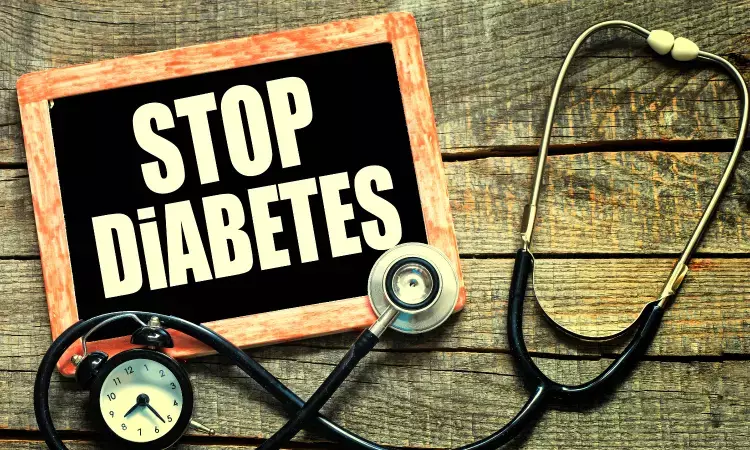- Home
- Medical news & Guidelines
- Anesthesiology
- Cardiology and CTVS
- Critical Care
- Dentistry
- Dermatology
- Diabetes and Endocrinology
- ENT
- Gastroenterology
- Medicine
- Nephrology
- Neurology
- Obstretics-Gynaecology
- Oncology
- Ophthalmology
- Orthopaedics
- Pediatrics-Neonatology
- Psychiatry
- Pulmonology
- Radiology
- Surgery
- Urology
- Laboratory Medicine
- Diet
- Nursing
- Paramedical
- Physiotherapy
- Health news
- Fact Check
- Bone Health Fact Check
- Brain Health Fact Check
- Cancer Related Fact Check
- Child Care Fact Check
- Dental and oral health fact check
- Diabetes and metabolic health fact check
- Diet and Nutrition Fact Check
- Eye and ENT Care Fact Check
- Fitness fact check
- Gut health fact check
- Heart health fact check
- Kidney health fact check
- Medical education fact check
- Men's health fact check
- Respiratory fact check
- Skin and hair care fact check
- Vaccine and Immunization fact check
- Women's health fact check
- AYUSH
- State News
- Andaman and Nicobar Islands
- Andhra Pradesh
- Arunachal Pradesh
- Assam
- Bihar
- Chandigarh
- Chattisgarh
- Dadra and Nagar Haveli
- Daman and Diu
- Delhi
- Goa
- Gujarat
- Haryana
- Himachal Pradesh
- Jammu & Kashmir
- Jharkhand
- Karnataka
- Kerala
- Ladakh
- Lakshadweep
- Madhya Pradesh
- Maharashtra
- Manipur
- Meghalaya
- Mizoram
- Nagaland
- Odisha
- Puducherry
- Punjab
- Rajasthan
- Sikkim
- Tamil Nadu
- Telangana
- Tripura
- Uttar Pradesh
- Uttrakhand
- West Bengal
- Medical Education
- Industry
Biphosphonates use for osteoporosis may protect against incident diabetes

Taiwan: A study published in the Osteoporosis International journal has concluded that Patients on Biphosphonates (BPs) have a reduced risk of incident diabetes compared to those without BP.
It is already known that Biphosphonates (BPs) improve glycemic control. Osteoporosis and type 2 diabetes are emerging global health problems. These conditions are related to increased morbidity and mortality. There is an urgent need for the prevention and management of the disease.
Bisphosphonates like alendronate are the first-line treatment of osteoporosis. A study published in Frontiers in Endocrinology entitled "Alendronate Use and Risk of Type 2 Diabetes: A Nationwide Danish Nested Case-Control Study" has mentioned the protective effect of alendronate against type 2 diabetes development in a dose-dependent manner.
Considering this, a study was conducted by a team of researchers to evaluate the bisphosphonate impact on glycemic control and incident diabetes risk. The lead researcher was Dr Chen from the Department of Physical Medicine and Rehabilitation at Hualien Tzu Chi Hospital.
The key study points are:
• The database used was MEDLINE, Embase, and Cochrane Library.
• The studies included comparing fasting blood glucose (FBG) and HbA1c levels and the risk of diabetes with and without bisphosphonates.
• Random effects models were used to calculate pooled RR and weighted mean difference (WMD).
• A total of Seven studies were included.
• There were two post hoc analyses of RCTs and five observational studies.
• The total number of participants was 1,233,844.
• BPs significantly reduced the risk of diabetes with an RR of 0.77 and a P value of 0.002 compared to the controls.
• In the subgroup of post hoc analyses , there was a non-significant association with an RR of 0.93 and a P value of 0.576.
• Three studies included 4906 participants on FBG, and one had 60 participants on HbA1c.
• There is a non-significant association between BPs and changes in FBG and HbA1c with WMD of − 0.61 mg/dL and − 0.11%, respectively.
• The P values were 0.567 and 0.083, respectively.
The researchers said that,
Patients with BPs have a reduced risk of incident diabetes compared to those without BPs. We warrant further investigations to investigate if the findings are causal.
Further reading:
Chen, PW., Su, HY., Tu, YK. et al. Association of bisphosphonates with diabetes risk and glycemic control: a meta-analysis. Osteoporos Int (2022).
BDS, MDS in Periodontics and Implantology
Dr. Aditi Yadav is a BDS, MDS in Periodontics and Implantology. She has a clinical experience of 5 years as a laser dental surgeon. She also has a Diploma in clinical research and pharmacovigilance and is a Certified data scientist. She is currently working as a content developer in e-health services. Dr. Yadav has a keen interest in Medical Journalism and is actively involved in Medical Research writing.
Dr Kamal Kant Kohli-MBBS, DTCD- a chest specialist with more than 30 years of practice and a flair for writing clinical articles, Dr Kamal Kant Kohli joined Medical Dialogues as a Chief Editor of Medical News. Besides writing articles, as an editor, he proofreads and verifies all the medical content published on Medical Dialogues including those coming from journals, studies,medical conferences,guidelines etc. Email: drkohli@medicaldialogues.in. Contact no. 011-43720751


